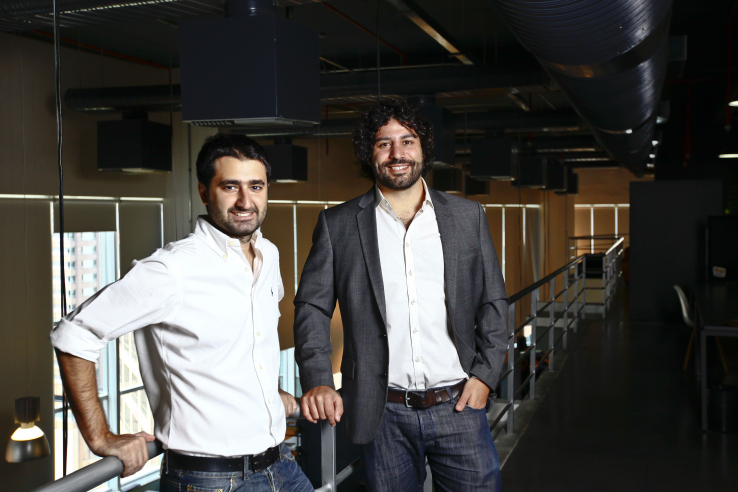

Sometimes it’s a startup business, and not political power, that grows out of the barrel of a gun.
At least, that’s the story behind Trocafone, a Brazilian startup that just raised $7 million for its services buying, refurbishing, and re-selling smartphones across Latin America. The company’s journey began with an armed robbery in Argentina.
In 2013, Guillermo Freire had just returned to Buenos Aires armed with a newly minted MBA from MIT, a laptop, a (newish) cell phone, and a desire to build a successful business in Latin America. One day, while he was laboring over ideas for his potential startup at a local cafe, Freire met a man who was armed with a gun.
With his computer and phone stolen, Freire turned to the grey-market in Buenos Aires to get another phone. And that experience started him down the path that would eventually lead him to Sao Paulo, and to the $7 million in financing Trocafone has just raised from Sallfort, FundersClub, Rocketship, and others.
At this point, it’s worth explaining a bit about the mobile phone market in Latin America. The continent, with its 600 million residents, is the 4th largest market for smartphones. Yet, despite demand, almost 70% of the population can’t afford phones thanks to high costs. (Coming in at $1200 for a basic iPhone 7, Brazil is home to the world’s most expensive iPhone).
Taxes on luxury goods mean that smartphones in Latin America are nearly twice as expensive as they are in the low-growth markets of Europe and North America, despite the fact that the minimum wage is two-thirds lower across Latin America.

The lack of smartphone adoption caused by the price differential is actually compounded by the lack of a resale market in the region. The continent’s wealthiest citizens replace their devices at roughly the same pace as the rest of the world — every 18 to 24 months, but they don’t resell them because of the risks and inconveniences associated with operating in grey markets around the country. No official reseller existed.
That’s where Trocafone comes in. After being robbed once at gunpoint, Freire was robbed again when he bought a defective phone for $400 off of a vendor he found through one of Buenos Aires’ online marketplace operators.
Thinking there must be a better way, he went over to a (wealthier) friend’s house to complain about his misfortune. His friend and co-founder Guilermo Arslanian… in turn… reached into a dresser, pulled out a used smartphone and tossed it to Freire. So a business was born.
Now Trocafone is the largest reseller of certified used phones in Brazil, according to Freire. The company has partnerships with most major brands and buys back, refurbishes and sells smartphones that wealthy Latin Americans no longer use. The notion of certification is important, because in addition to quality, it keeps phones acquired in … less-than-ideal circumstances … from being sold through the company (ideally serving as a deterrent to theft).
“Yes we are integrated with GSMA which owns the international blacklist of smartphones,” Freire wrote to me in an email. “Before buying the smartphone we check the IMEI, and if it is in the blacklist we won’t buy it.”
To hear Freire tell it, the certified refurbished phone business is a new one for Latin America. “Even thought the buyback programs in the U.S. have been existing for many years, we were the first to launch a trade-in program with Samsung two years ago,” says Freire.
The company manages buyback programs for the biggest global brands and sells directly to consumers through its web portal, Freire says.
The company’s currently selling $3 million worth of phones per month and expects to hit a run rate of $70 million by November, Freire says.
Previous investors in the company include 500 Startups, Lumia Capital Partners and Telefonica.
Money from the company’s latest round will help fuel international expansion. The company began operating in Argentina in March 2016 and intends to continue to grow its business in other Latin American and global markets.
“When we see this market, this is not just a Latin American, it’s an emerging market play,” says Freire. “The cost of technology has to be high, middle class incomes have to be low, and carriers have to not subsidize smart phones.”
But what of the inexpensive Chinese cell phones that Xiaomi and other manufacturers are bringing to global markets from Shenzhen? Freire says they’re not really an option for Latin American consumers.
“Xiaomi entered the market two years ago and exited the market six months ago,” says Freire. “Cheap Chinese smart phones are not performing. When a lower-class Brazilian guy has to decide whether to buy a new Chinese smart phone for $100 or a used iPhone 5 for $100, they don’t even think about it. They want to have the iPhone. ”

